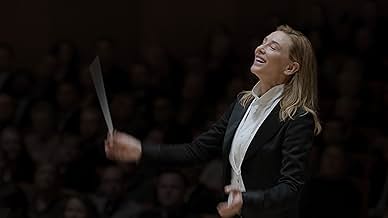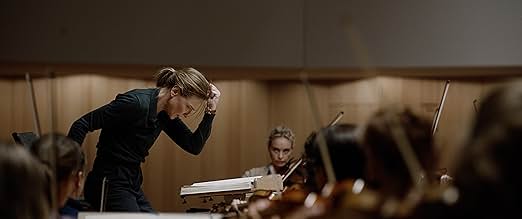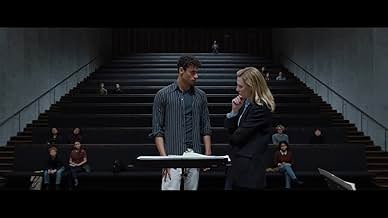Uno sguardo al mondo internazionale della musica classica incentrato su Lydia Tár, una delle più grandi compositrici e direttrici d'orchestra viva, e la prima donna, direttrice principale in... Leggi tuttoUno sguardo al mondo internazionale della musica classica incentrato su Lydia Tár, una delle più grandi compositrici e direttrici d'orchestra viva, e la prima donna, direttrice principale in assoluto di una grande orchestra tedesca.Uno sguardo al mondo internazionale della musica classica incentrato su Lydia Tár, una delle più grandi compositrici e direttrici d'orchestra viva, e la prima donna, direttrice principale in assoluto di una grande orchestra tedesca.
- Regia
- Sceneggiatura
- Star
- Candidato a 6 Oscar
- 79 vittorie e 271 candidature totali
Zethphan D. Smith-Gneist
- Max
- (as Zethphan Smith-Gneist)
Alec Baldwin
- Alec Baldwin
- (voce)
Recensioni in evidenza
'Tár', one of the most talked about films of 2022 and a serious contender for the Academy Awards, with six nominations, is written and directed by Todd Field - a filmmaker who does not seem at all rushed or prone to accumulate impressive numbers in his filmography. In fact 'Tár' is only his third feature film and it is made 16 years after the previous one. The fictional biography of a great musician - symphony orchestra conductor - 'Tár' seems and was written for Cate Blanchett and suits her to such an extent that after watching it it is hard to imagine another actress in this role. It's a complex and loooooong film (yes, that's its main problem!) which in almost three hours of projection manages to bring to the screen a multitude of problems related to the world of great musicians and the way they combine their careers with their personal lives, about the place of women in a competitive world where private lives are scrutinized and mistakes are not forgiven, about the role of media and social networks in celebrity careers, and about political correctness and its verdicts in the public square of the Internet age. Above all, however, it is a film about the power games in the fascinating and complicated world of great art.
The titular heroine of the film, Lydia Tár, seems to be a model of success in every way. A student of Leonard Berstein, she is one of the world's great conductors, winner of all possible awards, principal conductor of the Berlin Orchestra and professor at Julliard. She has, of course, had to work hard and fight fiercely for this position, as a woman and as a lesbian (her partner is the concertmaster of the orchestra), but the beginning of the film catches her at her peak and the past is not mentioned until it begins to insinuate in the present. Relationships with his daughter, an elementary school student, indicate traumas in the distant past. A conductor with whom she had a more recent relationship pursues her obsessively, and Lydia retaliates by blocking her artistic career. Her position of power seems to allow all but also requires her to make decisions that do not always seem completely professionally motivated. Sometimes it seems that she uses her power to fuel personal passions, but everything happens in an ambiguous zone. Her faithful assistant is skipped by her from a promotion, an instrumentalist in the orchestra is loses to a younger candidate the opportunity to perform a concert, in one of the lessons at Julliard she adopts a very politically incorrect attitude in a dialogue with a student. These are small and debatable incidents, but in all cases the decisions are hers alone. Perfectionism can be a great quality of a conductor who must have absolute control over every sound, tempo and nuance in a concert or recording. But life is more complicated, even than a Mahler symphony.
Director Todd Field seems to have drawn himself inspiration from his character, making some creative decisions that influence how the film looks. However, not all of them are for the benefit of the movie, some seemed questionable to me. The film begins with the credits that usually roll at the end, when the lights come up and the audience leaves the theater. It's a nice sign of respect for the technical team, but should this take precedence over the spectators in the cinema halls? The length of the film far exceeds that of Mahler's symphonies. Yes, this is the fashion in Hollywood, but here I feel that more brevity would have served the film. The first half hour seems like a docu-drama (an excellent one, by the way) about the life of a great musician, and another hour or so passes - spent in the stratosphere of the world of great musicians, in concert halls and luxurious apartments where the pianos don't even fill the spaces, until the drama really kicks off. Indeed, when events rush headlong, we are dealing with a genuine drama, which calls into question the entire world of intellectual and material luxury in which we had been immersed until then. The filming style also changes, from documentary style and long one-shots (see the Julliard scene) in the first part, to nervous editing with action film techniques. Neither the world of music with its intrigues and power games, nor that of the media and social media that can destroy lives and careers come out well in the story conceived by screenwriter Todd Field. The generosity in duration allows for the construction of several memorable roles - mostly feminine. I don't know if Cate Blanchett will get the Best Actress Academy Award this year again (it would be her third time), but her role seemed to me one of the best of a career in which I don't remember any failures or miscasts. I'd rather bet on the award for original script. We will see. In any case, 'Tár' is one of the most interesting films of the year, but also one of those that demands the attention and patience of the viewers. Using, again, the metaphor of Mahler's music, just as his symphonies are not liked by every classical music-loving audience, this film is not intended for every moviegoer. But those who like it, will like it a lot.
The titular heroine of the film, Lydia Tár, seems to be a model of success in every way. A student of Leonard Berstein, she is one of the world's great conductors, winner of all possible awards, principal conductor of the Berlin Orchestra and professor at Julliard. She has, of course, had to work hard and fight fiercely for this position, as a woman and as a lesbian (her partner is the concertmaster of the orchestra), but the beginning of the film catches her at her peak and the past is not mentioned until it begins to insinuate in the present. Relationships with his daughter, an elementary school student, indicate traumas in the distant past. A conductor with whom she had a more recent relationship pursues her obsessively, and Lydia retaliates by blocking her artistic career. Her position of power seems to allow all but also requires her to make decisions that do not always seem completely professionally motivated. Sometimes it seems that she uses her power to fuel personal passions, but everything happens in an ambiguous zone. Her faithful assistant is skipped by her from a promotion, an instrumentalist in the orchestra is loses to a younger candidate the opportunity to perform a concert, in one of the lessons at Julliard she adopts a very politically incorrect attitude in a dialogue with a student. These are small and debatable incidents, but in all cases the decisions are hers alone. Perfectionism can be a great quality of a conductor who must have absolute control over every sound, tempo and nuance in a concert or recording. But life is more complicated, even than a Mahler symphony.
Director Todd Field seems to have drawn himself inspiration from his character, making some creative decisions that influence how the film looks. However, not all of them are for the benefit of the movie, some seemed questionable to me. The film begins with the credits that usually roll at the end, when the lights come up and the audience leaves the theater. It's a nice sign of respect for the technical team, but should this take precedence over the spectators in the cinema halls? The length of the film far exceeds that of Mahler's symphonies. Yes, this is the fashion in Hollywood, but here I feel that more brevity would have served the film. The first half hour seems like a docu-drama (an excellent one, by the way) about the life of a great musician, and another hour or so passes - spent in the stratosphere of the world of great musicians, in concert halls and luxurious apartments where the pianos don't even fill the spaces, until the drama really kicks off. Indeed, when events rush headlong, we are dealing with a genuine drama, which calls into question the entire world of intellectual and material luxury in which we had been immersed until then. The filming style also changes, from documentary style and long one-shots (see the Julliard scene) in the first part, to nervous editing with action film techniques. Neither the world of music with its intrigues and power games, nor that of the media and social media that can destroy lives and careers come out well in the story conceived by screenwriter Todd Field. The generosity in duration allows for the construction of several memorable roles - mostly feminine. I don't know if Cate Blanchett will get the Best Actress Academy Award this year again (it would be her third time), but her role seemed to me one of the best of a career in which I don't remember any failures or miscasts. I'd rather bet on the award for original script. We will see. In any case, 'Tár' is one of the most interesting films of the year, but also one of those that demands the attention and patience of the viewers. Using, again, the metaphor of Mahler's music, just as his symphonies are not liked by every classical music-loving audience, this film is not intended for every moviegoer. But those who like it, will like it a lot.
Initially I was put off by Tár-it's cryptic, drab, and sluggish. Until I realized what the filmmakers were actually accomplishing. No spoilers in this review, but to enjoy the film you have to know certain things:
1. Yes, Cate Blanchett is fantastic and rightfully deserves the accolades.
2. The film is the slowest of slow burns.
3. The film does not hold your hand.
4. The film's narrative cuts out key elements of scenes that other filmmakers would have highlighted. This was the sticking point for me-it didn't dawn on me until halfway through the film what was happening. If you know this going in, I believe you'll have a better experience with the film. The film purposefully *doesn't* show you the "important" elements of scenes or relationships between characters. You have to figure that out yourself, just like putting together the puzzle of who Lydia Tár actually is. Here's a quick non-related example:
Bill stared at the smoke in the frying pan.
Bill rubbed his nose five times and took a call from Ernest while sipping coffee at Station 271.
If those two sentences above were in a book, it would be leaving out major plot points that other authors would have filled in. First, there was a fire in Bill's kitchen. He called the fire department. He had to evacuate, so the fire may have been bad. And who is Ernest, if we have not been introduced to that character before? Why is bill rubbing his nose so much? Is it a tick or OCD or nervous habit?
That's what Tár is like. It presents to you all the items "between the lines" and lets you solve for X for yourself. Once I understood that that was the dominant cinematic approach in this film, it became immensely more enjoyable...and challenging. Very much worth your time if you put in the effort.
1. Yes, Cate Blanchett is fantastic and rightfully deserves the accolades.
2. The film is the slowest of slow burns.
3. The film does not hold your hand.
4. The film's narrative cuts out key elements of scenes that other filmmakers would have highlighted. This was the sticking point for me-it didn't dawn on me until halfway through the film what was happening. If you know this going in, I believe you'll have a better experience with the film. The film purposefully *doesn't* show you the "important" elements of scenes or relationships between characters. You have to figure that out yourself, just like putting together the puzzle of who Lydia Tár actually is. Here's a quick non-related example:
Bill stared at the smoke in the frying pan.
Bill rubbed his nose five times and took a call from Ernest while sipping coffee at Station 271.
If those two sentences above were in a book, it would be leaving out major plot points that other authors would have filled in. First, there was a fire in Bill's kitchen. He called the fire department. He had to evacuate, so the fire may have been bad. And who is Ernest, if we have not been introduced to that character before? Why is bill rubbing his nose so much? Is it a tick or OCD or nervous habit?
That's what Tár is like. It presents to you all the items "between the lines" and lets you solve for X for yourself. Once I understood that that was the dominant cinematic approach in this film, it became immensely more enjoyable...and challenging. Very much worth your time if you put in the effort.
If you are not familiar with classical music, probably almost the entire first hour will be very difficult to sit through. The dialogue is PACKED with references to classical music artists/works/history/etc. Not to mention there are constant little allusions to different plot threads which make up Tar's whole story.
However, this dies down gradually and the movie becomes much more focused and simple. Blanchett is incredible, but not in a showy way at all. Her conducting moments were awesome. The story is political and relevant, and handled very well and balanced-like.
There is a surprisingly creepy vibe to the film, that borders on something almost like a horror movie at times. It's quite unnerving.
One of the best movies i've seen all year! Probably Todd Field's best work yet.
However, this dies down gradually and the movie becomes much more focused and simple. Blanchett is incredible, but not in a showy way at all. Her conducting moments were awesome. The story is political and relevant, and handled very well and balanced-like.
There is a surprisingly creepy vibe to the film, that borders on something almost like a horror movie at times. It's quite unnerving.
One of the best movies i've seen all year! Probably Todd Field's best work yet.
Everybody writing about this mock biopic focuses on Cate Blanchett's knock-it-out-of-the-park performance, but when compared to Field's "Little Children" (2006), "Tár" lacks the storytelling and editing skills which make the earlier film a masterpiece of human relations, whereas the latter is an interesting character study that somehow collapses under its own weight.
There's a strong establishing scene showing Tár demolishing an aspiring musician's conceited views on Bach, yet one has to wait for a long time for a follow-up showing the main character's boundary issues. The central topic emerges rather quickly (abuse of power), but there are diversions which support character development, yet drag on the narrative, which is probably why many reviews here find the film frustrating.
Being an ex-Berliner, I like the fact that the city is being used as a real location as opposed to the usual tourist / Cold War hot spots, and the Philharmonics rehearsal scenes are very well done, but they don't really push the story forward and could have easily been wound down a bit.
Nina Hoss as Tár's partner is a brilliant counterpoint, because she keeps a good deal of her thoughts to herself until she doesn't, so more focus on their relationship would have helped the story. Hoss would deserve a supporting actress Academy Award nod if only she had more screen time.
The initial scene of conflict eventually loops back into focus, and Field could have used this to explore societal misjudgment as he did in "Little Children" - but he doesn't, which makes "Tár" rather distant and cold. Field expects viewers to interpret a lot on their own, which is bold and demanding, but with this approach it is crucial to keep focus on an underlying message, otherwise it gets lost.
In conclusion, "Tár" has all the ingredients for a masterpiece - interesting characters, great performances, nice camerawork - but weak storytelling ultimately reduces the film's potential.
There's a strong establishing scene showing Tár demolishing an aspiring musician's conceited views on Bach, yet one has to wait for a long time for a follow-up showing the main character's boundary issues. The central topic emerges rather quickly (abuse of power), but there are diversions which support character development, yet drag on the narrative, which is probably why many reviews here find the film frustrating.
Being an ex-Berliner, I like the fact that the city is being used as a real location as opposed to the usual tourist / Cold War hot spots, and the Philharmonics rehearsal scenes are very well done, but they don't really push the story forward and could have easily been wound down a bit.
Nina Hoss as Tár's partner is a brilliant counterpoint, because she keeps a good deal of her thoughts to herself until she doesn't, so more focus on their relationship would have helped the story. Hoss would deserve a supporting actress Academy Award nod if only she had more screen time.
The initial scene of conflict eventually loops back into focus, and Field could have used this to explore societal misjudgment as he did in "Little Children" - but he doesn't, which makes "Tár" rather distant and cold. Field expects viewers to interpret a lot on their own, which is bold and demanding, but with this approach it is crucial to keep focus on an underlying message, otherwise it gets lost.
In conclusion, "Tár" has all the ingredients for a masterpiece - interesting characters, great performances, nice camerawork - but weak storytelling ultimately reduces the film's potential.
Tár is a dense film. Thick with dialogue and emotional power. It's also a bit tricky to get in to and might be a bit much for the casual viewer. That's a shame though as it's great. Lydia Tár (Cate Blanchett) is a renowned concert conductor. An opening montage leads us into a live interview with the New Yorker, introducing her achievements to date. Let's just say it's a stellar CV. Right from the off, Tár is a force. Confident and assertive, but there are hints of the smallest of cracks. People will often misunderstand the role of a conductor, reducing it to something almost needless. Director and writer Todd Field knows this and lets that opening interview roll, as a device it not only introduces us to Tár, but the world of classical orchestration and her interpretation of it. Like I said, dense. At the top of her game, there's plenty of admirers, both publicly and professionally. Like Elliot Kaplan (Mark Strong) with a fantastic wig, who's told "There's no glory for a robot, do your own thing". Or a room full of nervous students at Juilliard, who also feel the wrath of Tár's uncompromising views. She's putting a lot of herself out there, is she as certain of herself as she appears though and when everything appears so perfect and controlled, what aren't we seeing. Those potential cracks show themselves through Francesca (Noémie Merlant), she's the assistant. Seemingly subordinate, she's clearly privy to some weakness, could be the weakness, or quite the opposite. Tár's partner Sharon (Nina Hoss) too. She has a fragility and brings out a tenderness in Tár, but there's something else. It's clear that Tár intends on retaining her position, status, power. Ruthlessly if required. These personal moments though really help the flow of this film. Although slightly bleak, they're a breath of fresh air in Tár's austere world. It's a beautiful world though. Rooms vast with modernist lines and understated grandeur. I find myself lost in these spaces as Tár too begins to ebb. I can imagine that classical music students might lap the opening acts up, it feels important. Is it though, or is it an impenetrable pretentious three hour indulgence. I'd say it's neither. It's a slow burning drama. That doesn't so much as unfold as gently slides into a darkness as Tár's facade crumbles. Accelerated by the arrival Olga (Sophie Kauer) a no nonsense Russian cellist, brought in to help a live performance recording of Mahler's Symphony No.5... but is anything but a stabilising presence. It demands your attention. Blanchett is incredible. It's an explosive performance. Utterly captivating. A singular pivotal presence. "It's not a democracy". She needs to be too. At not far off 3 hours, it's an intense experience. Be prepared to be patient, but you will be rewarded.
Lo sapevi?
- QuizProfessional cellist Sophie Kauer had no prior acting experience and auditioned at the encouragement of a friend. She learned to act by watching YouTube tutorials hosted by Michael Caine.
- BlooperWhen Lydia is talking to the two technicians after a rehearsal in Berlin, she requests they send her audio and video recordings, but the console in front of them in the booth is actually for controlling lights, not audio/video.
- Curiosità sui creditiThe opening credits presents the film crew and acknowledgments (usually shown at the end titles) without presenting the actors. The actors and soundtrack are shown at the ending without the crew.
- ConnessioniEdited from The Blair Witch Project - Il mistero della strega di Blair (1999)
- Colonne sonoreDas Wohltemperierte Klavier: Präludium and Fuge C-Dur, BWV 846
Written by Johann Sebastian Bach
Piano, Cate Blanchett
I più visti
Accedi per valutare e creare un elenco di titoli salvati per ottenere consigli personalizzati
- How long is Tár?Powered by Alexa
Dettagli
- Data di uscita
- Paese di origine
- Siti ufficiali
- Lingue
- Celebre anche come
- Tar
- Luoghi delle riprese
- Dresda, Sassonia, Germania(Kulturpalast & Großen Garten Platz)
- Aziende produttrici
- Vedi altri crediti dell’azienda su IMDbPro
Botteghino
- Budget
- 25.000.000 USD (previsto)
- Lordo Stati Uniti e Canada
- 6.773.650 USD
- Fine settimana di apertura Stati Uniti e Canada
- 158.620 USD
- 9 ott 2022
- Lordo in tutto il mondo
- 29.177.163 USD
- Tempo di esecuzione
- 2h 38min(158 min)
- Colore
- Mix di suoni
- Proporzioni
- 2.39 : 1
Contribuisci a questa pagina
Suggerisci una modifica o aggiungi i contenuti mancanti



































